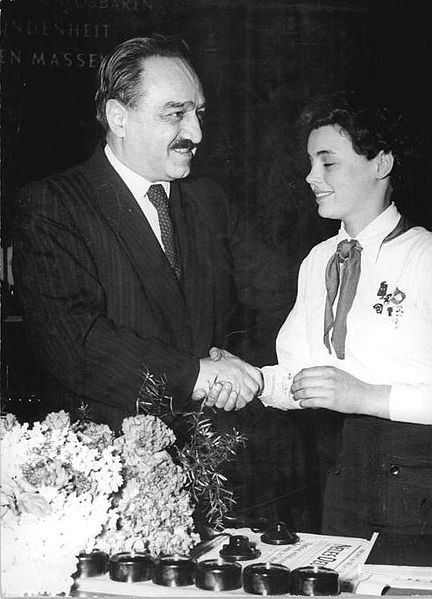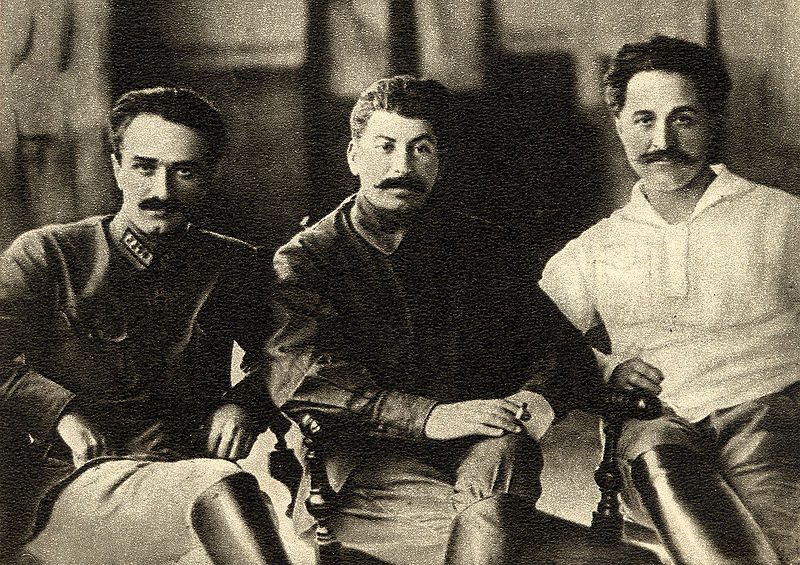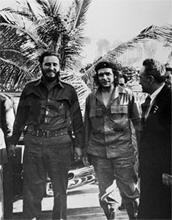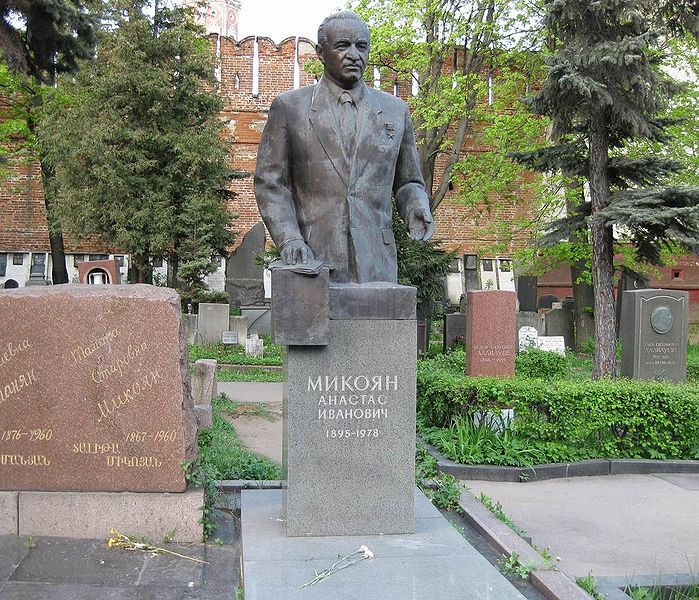<Back to Index>
- Physicist Julius Robert von Mayer, 1814
- Writer José Maria de Eça de Queiroz, 1845
- Chairman of the Presidium of the Supreme Soviet Anastas Ivanovich Mikoyan, 1895
PAGE SPONSOR


Anastas Mikoyan (Armenian: Անաստաս Հովհաննեսի Միկոյան, Anastas Hovhannesi Mikoyan; Russian: Анаста́с Ива́нович Микоя́н, Anastas Ivanovich Mikoyan; November 25 [O.S. November 13] 1895 – October 21, 1978) was an Armenian Old Bolshevik and Soviet statesman during the Stalin and Khrushchev years. Mikoyan became an early convert to the Bolshevik cause. He supported Stalin after Vladimir Lenin's death in 1924 left a power vacuum. During Stalin's rule, Mikoyan held several high governmental posts, including that of Minister of Trade. After Stalin's death, he backed Nikita Khrushchev and his de-stalinization policy.
Mikoyan made several key trips to communist Cuba and
to the United States, acquiring an important stature on the
international diplomatic scene. In 1964, Khrushchev had to step down in
a coup that brought Leonid Brezhnev to power. Mikoyan retained influence under Brezhnev, and served as Chairman of the Presidium of the Supreme Soviet from
1964 until his retirement in 1965. His position under Khrushchev made
him the second most powerful figure in the Soviet Union at the time. Nicknamed the "Survivor", he became the subject of a popular saying in Russian: "From Illich [Lenin] to Illich [Leonid Illich Brezhnev]... without accident or stroke!" One veteran Soviet official described his political career in the following manner: "The rascal was able to walk through Red Square on a rainy day without an umbrella [and] without getting wet. He could dodge the raindrops." Anastas Mikoyan was born in the village of Sanahin, then a part of the Yelizavetpol Governorate (as of 2010 a part of Alaverdi in Armenia's Lori Province) in 1895. His father, Hovhannes, worked as a carpenter and his mother as a rug weaver. He had one younger brother, Artem Ivanovich Mikoyan, who would go on to become the co-founder and one of the primary designers of the Soviet MiG military aircraft. Mikoyan received his education at the Nersisyan Theological seminary in Tiflis and the Gevorkian Theological Seminary in Echmiadzin. Religion,
however, played an increasingly insignificant role in his life, as he
would later remark that his continued studies in theology drew him
closer to atheism:
"I had a very clear feeling that I didn't believe in God and that I had
in fact received a certificate in materialist uncertainty; the more I
studied religious subjects, the less I believed in God." At school, he took several courses on liberalism and socialism, which brought him closer to the leftist revolutionary movements in Russia. At the age of twenty, he formed a workers' soviet in Echmiadzin. In 1915, Mikoyan formally joined the Bolshevik faction of the Russian Social Democratic Labour Party (later known as the Bolshevik Party) and became a leader of the revolutionary movement in the Caucasus. His interactions with Soviet revolutionaries led him to Baku, where he became the co-editor for the Armenian language newspaper Sotsyal-Demokrat and later on for the Russian language paper Izvestia Bakinskogo Soveta. After the February 1917 revolution, which toppled the tsarist government, Mikoyan and other Bolsheviks fought against anti-Bolshevik elements in the Caucasus. Mikoyan became a commissar in the newly formed Red Army and
continued to fight in Baku against anti-Bolshevik forces. He was
wounded in this fighting and was noted for saving the life of fellow
Party member Sergo Ordzhonikidze. Afterwards, he continued his Party work, becoming one of the co-founders of the Baku Soviet, which lasted until 1918, when he and twenty-six other commissars fled Baku and were captured by the Transcaspian Government. Known as the Baku 26,
all twenty-six commissars were executed with the sole exception of
Mikoyan, the circumstances of his survival shrouded in mystery.
Mikoyan supported Stalin in the power struggle that followed Lenin's death in 1924 - he had become a member of the Bolshevik Central Committee in
1923. As People's Commissar for External and Internal Trade from 1926
he imported ideas from the West, such as the manufacture of canned
goods. In
1935 he was elected to the Politburo, and was among one of the first
Soviet leaders to pay goodwill trips to the United States in order to
boost economic cooperation. Mikoyan spent three months in the United
States, where he not only learned more about its food industry but also
met and spoke with Henry Ford and inspected Macy's in
New York. When he returned, Mikoyan introduced a number of popular
American commodities to the Soviet Union, including American hamburgers and ice cream. In September 1939, Nazi Germany and
the Soviet Union each carved out their own spheres of influence in
Poland and Eastern Europe. The Soviets had arrested 26,000 Polish
officers in the eastern portion of Poland and after some deliberation,
in March 1940, Stalin and a number of other high-ranking officials,
Mikoyan included, signed an order for their execution. When
Germany invaded the Soviet Union in June 1941, Mikoyan was placed in
charge of organizing the transportation of food and supplies. His son
Vladimir, a pilot in the Red Air Force, died in combat when shot down over Stalingrad. In 1942 Mikoyan became a member of the State Defense Committee and for his war efforts, was decorated with a Hero of Socialist Labor in 1943. In 1946, Mikoyan became the vice chairman of the Council of Ministers. Shortly before his death in 1953, Stalin considered launching a new purge against Mikoyan, Georgy Malenkov,
and several other Party leaders. This, however, never came to fruition
as Stalin died before he could put any plan into motion. Mikoyan originally argued in favor of keeping Stalin's right-hand man, Lavrenty Beria,
from punishment but later gave in to popular support among Party
members for his arrest. He remained in the government after Stalin's
death, in the post of Minister of Trade, under Malenkov. He supported
Khrushchev in the power struggle to succeed Stalin, and became First
Deputy Premier of the Soviet Union in recognition of his services.
In 1956, Mikoyan helped Khrushchev organize the Secret Speech which Khrushchev delivered to the 20th Party Congress, denouncing Stalin's personality cult. In October of that year, he was sent to Hungary to gather information on the developing crisis caused by the revolution against the communist government there. Together with Mikhail Suslov,
Mikoyan traveled in an armored personnel carrier to Budapest, due to
the shooting on the streets. He sent a telegram to Moscow reporting his
impressions of the situation. "We had the impression that Ernő Gerő especially,
but the other comrades as well, are exaggerating the strength of the
opponent and underestimating their own strength," he and Suslov wrote. Mikoyan
strongly opposed the decision by Khrushchev and the Politburo to use
Soviet troops, believing it would destroy the Soviet Union's
international reputation, instead arguing for "military intimidation"
and economic pressure to be applied to Hungary's government. The crushing of the revolution by Soviet forces nearly led to Mikoyan's resignation. In
1957 Mikoyan refused to back an attempt by Malenkov and Molotov to
remove Khrushchev from power, thus securing his own position as one of
Khrushchev's closest allies. He backed Khrushchev because of his strong
support for de-Stalinization and his belief that a triumph by the plotters might have given way to purges similar to the ones in the 1930s. During
Khruschchev's premiership he continued to hold numerous posts in the
field of trade and made a number of state visits to the US, Japan, and
Mexico, retaining the title of First Deputy Premier. Mikoyan continued to hold moderate views on the Cold War and disapproved of Khrushchev's brinkmanship over Berlin in the Checkpoint Charlie Crisis of 1961 and of Khrushchev's walkout from the 1960 Paris Summit over the U-2 Crisis of 1960,
which he believed kept tension in the Cold War high for another fifteen
years. However, throughout this time, he remained Khrushchev's closest
ally in the upper echelons of the Soviet leadership.
The Soviet government welcomed the overthrow of Cuban president Fulgencio Batista by Fidel Castro's pro-communist rebels in 1959. Khrushchev realized the potential of a Soviet ally in the Caribbean and dispatched Mikoyan as one of the top diplomats in the region.
He was the first Soviet official to visit the island country after the
revolution, securing important trade agreements with the new
government, including the export of oil from the Soviet Union in
exchange for Cuban sugar. He
left Cuba with a very positive impression, saying that the atmosphere
there made him feel "as though I had returned to my childhood." During the Cuban Missile Crisis, Mikoyan was sent to Cuba where he persuaded Castro to remove the
nuclear missiles and bombers the Soviet Union had placed on the island. Just
prior to beginning negotiations with Castro, Mikoyan was informed about
the death of his wife, Ashkhen, in Moscow; rather than return there for
the funeral, Mikoyan opted to stay and sent his son Sergo there instead. Khrushchev's
liberalization of hard-line policies led to an improvement in relations
between the Soviet Union and the United States during the late 1950s.
As Khrushchev's primary emissary, Mikoyan visited the United States
several times. Despite the volatility of the Cold War between the two
superpowers, many Americans received Mikoyan amiably, including Minnesota Democrat, Hubert Humphrey who characterized him as someone who showed a "flexibility of attitude" and New York governor Averell Harriman, who described him as a "less rigid" Soviet politician. His visits in the United States also included luncheons with Senators from the Senate Foreign Relations Committee and with United States President Dwight D. Eisenhower. His importance and stature was gauged from his attendance at the funeral of U.S. President John F. Kennedy in 1963, representing the Soviet Union and reassuring President Lyndon Johnson that the Soviet Union had nothing to do with the assassination despite the involvement of Lee Harvey Oswald (Oswald had briefly defected to the Soviet Union before his involvement in the assassination of Kennedy). It is claimed by some that
by 1964 Mikoyan had become convinced that Khrushchev had turned into a
liability to the Party, and that he was involved in the October 1964
coup that brought Leonid Brezhnev to power. However, William Taubman disputes
this, as Mikoyan was the only member of the Presidium (the name for the
Politburo at this time) to defend Khrushchev. Mikoyan, however, did
vote to force Khrushchev's retirement (so as, in traditional Soviet
style, to make the vote unanimous). Alone among Khrushchev's colleagues
Mikoyan wished the former leader well in his retirement, though he
never spoke to him again. Mikoyan laid a wreath and sent a letter of
condolence at Khrushchev's funeral in 1971. Mikoyan retained influence under Brezhnev, becoming Chairman of the Presidium of the Supreme Soviet from 1964 until 1965 (when he retired). Mikoyan died on October 21, 1978, at the age of 82, from natural causes and was buried at Novodevichy Cemetery in Moscow. Mikoyan received a total of six commendations of the Order of Lenin.

